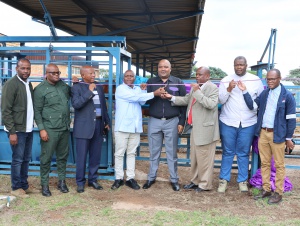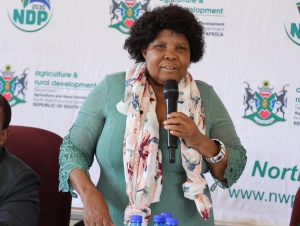MEC Madoda Sambatha Hands Over 5000-Layer Poultry Structure to Bongi G in JB Marks Municipality
Lindequesdrift – In efforts to strengthen rural economies, combat poverty, and ensure food security across the province, the MEC for North West Agriculture and Rural Development, Madoda Sambatha, officially handed over a state-of-the-art 5,000-layer poultry structure to emerging farmer Sibongile Gumede of Bongi G Farm in Lindequesdrift, during the 4th Phase of the Accelerated Service Delivery Programme on Friday, 25 April 2025, in the JB Marks Municipality.
The 5,000-layer facility will enable Bongi G Farm to scale up egg production significantly, contributing to local food supply chains and creating employment opportunities within the province. Bongi G is an enterprise dedicated to producing naturally grown, free-range poultry and eggs. The farm’s eggs undergo regular grading by the South African Poultry Association (SAPA) to ensure quality.
MEC Sambatha emphasised the importance of empowering small-scale farmers with the infrastructure and resources necessary for sustainable growth. “The handover is not just about providing a farm, it’s about creating growth opportunities, ensuring food security, and nurturing the essence of entrepreneurship within farmers,” said MEC Sambatha.
He further encouraged Bongi G to utilise the resources available to them responsibly and to continue working towards sustainable agricultural practices that will benefit future generations.
Speaking about receiving the state-of-the-art poultry structure, Sibongile Gumede said, “I am beyond grateful to the department for this opportunity. I am now able to sustain myself, create jobs, and, through the progress I have made, I have even managed to build a 3,000-layer structure on my own,” said an ecstatic Gumede.
The handover of the farm marks a momentous breakthrough in the province’s ongoing efforts to promote agricultural development, empowering local farmers and strengthening the agricultural sector, whilst ensuring that local farmers have the tools and support they need to thrive.
CAPTIONS
IMAGE 676A0049 & 676A0038:- MEC Madoda Sambatha and Sibongile Gumede during the official handover of Bongi G, a layer project
Issued by
The Directorate Communication Services
The North West Department of Agriculture and Rural Development
Director : Ms Emelda Setlhako
Cell : 060 745 4020
Email : ESetlhako@nwpg.gov.za
For enquiries contact:
Khutala Tshangela
MEC’s Media Liaison Officer
Cell: 066 458 6915 ktshangela06@gmail.com KTshangela@nwpg.gov.za
Website: www.dard.nwpg.gov.za
Facebook: www.facebook.com/nwpread




